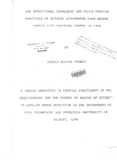| dc.description.abstract | Protein Energy Malnutrition (PEM) still remains a major health problem in Kenya and other developing countries. The factors associated with high prevalence of PEM in children are many but the immediate cause of death and malnutrition in children can be described as inadequate dietary intake and high prevalence of disease. The underlying problems leading to the immediate cause are food insecurity, poor maternal and child care, inadequate health services availability and use as well as unhealthy environment.
Various methods have been applied to reduce the prevalence of malnutrition as well as to treat severe forms. The method investigated here is the nutritional education component of institutional rehabilitation. It is assumed that mothers admitted with their malnourished children to the residential rehabilitation centres would acquire knowledge and change their child care and child feeding practices.
This study investigates the nutritional knowledge and chilc^feeding practices of 49 mothers previously admitted to Mbooni Family Life Training centre (a residential rehabilitation centre) and compares it with that of 46 mothers with no similar exposure. The nutritional status of 129 children from the two groups of mothers was also determined and compared.
IX
The results indicate that the nutritional knowledge of those mothers previously admitted was better than that of those not previously admitted but their child feeding practices were not different. The nutritional status of children of mothers who were not previously admitted was slightly better than that of children whose mothers had previously been admitted, however the difference was not significant (p=0.521). The social economic status of those mothers not previously admitted to MFLTC was better than that of those previously admitted.
This study questions the methodology of nutrition education applied in the rehabilitation centres and supports the need to identify a method that may lead to both attitude and behavioural change m the mothers with malnourished children to improve the child feeding practices once discharged from rehabilitation centres. | |

